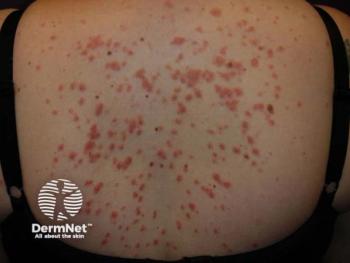
Exploring PDE4 Inhibitors in the Management of Plaque Psoriasis
Lisa Swanson, MD, FAAD and Robert J. Casquejo, PA-C discuss the shifting treatment landscape, shedding light on phosphodiesterase inhibitors-4 (PDE4) and comment on why it holds promise as a therapeutic target for immune-mediated diseases.
Episodes in this series

This is a video synopsis/summary of a panel discussion involving Lisa Swanson, MD, FAAD, and Robert J. Casquejo, PA-C.
In this discussion, dermatologists explore the role of phosphodiesterase-4 (PDE-4) inhibitors as a therapeutic option for immune-mediated diseases like psoriasis. They highlight the uniqueness of this class of medication, particularly its intracellular target, which contrasts with the extracellular targets of previous treatments like biologics. The first PDE-4 inhibitor, introduced orally, focused on inhibiting PDE-4 enzymatic action, converting cyclic adenosine monophosphate (cAMP) to adenosine monophosphate (AMP).
The dermatologists discuss the distinct features that set PDE-4 inhibitors apart, including a narrow side effect profile, offering a departure from the extensive lists associated with other medications such as methotrexate and cyclosporin. Notably, these inhibitors are administered orally, contributing to their uniqueness in the treatment landscape.
They delve into the biochemical action of PDE-4, explaining its role in cleaving cAMP to AMP and its connection to the cascade of pro-inflammatory mediators. The conversation introduces specific medications within this class, namely apremilast, an oral PDE-4 agent, and roflumilast, a topical PDE-4 inhibitor.
The dermatologists share their experiences with apremilast, discussing its initial success attributed to its oral form, narrow side effect profile, and ease of use compared to injections. They emphasize its efficacy in achieving PASI (psoriasis area and severity index) 75 numbers comparable to biologics, making it a viable option for systemic-naive patients.
As the discussion progresses, the dermatologists reflect on apremilast's current standing in the treatment landscape, acknowledging the emergence of other oral medications and exceptionally safe biologics. They note that apremilast retains its appeal, particularly as a starting point due to its clean safety profile, oral administration, and indication for mild psoriasis. The dermatologists highlight its significance for patients with mild disease, offering a systemic option for those averse to injections or seeking an alternative to topical treatments.
Video synopsis is AI-generated and reviewed by DermatologyTimes editorial staff.
Newsletter
Like what you’re reading? Subscribe to Dermatology Times for weekly updates on therapies, innovations, and real-world practice tips.











